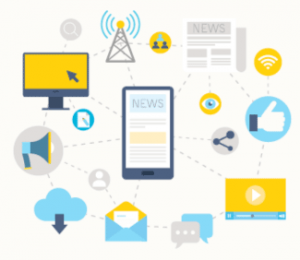About 
ReNews is a transnational project funded by the Erasmus + Programme of the European Union, aiming at improving Media Literacy Education (MLE) skills. ReNews works to build a new generation of “cyber-citizens”, reducing the vulnerability to hateful content and disinformation online.
What is Media Literacy and why is it important?
Media Literacy Education (MLE) aims to empower students to exercise their citizenship in an information and communication society and to train active, enlightened and responsible digital citizens. This field allows young people:
- To understand media, social networks and information in all their dimensions: economic, societal, technical, and ethical.
- To develop skills in research, selection and interpretation of information, as well as the evaluation of sources and contents.
- To assess the influence of media and information on thoughts, feelings, and behaviours.
- To demonstrate a civic practice of the media and develop a digital citizenship so that young people can take ownership of the media (both off and online) to create a space for individual and collective affirmation, but also for reflection, debate and participation. Furthermore, a society that knows how to handle media and information and encourages the development of free, independent, and pluralistic media is more likely to encourage meaningful public participation.
MLE is crucial as our information societies enabled the massive dissemination of information of all kinds made possible by new technologies and the Internet. In this context, MLE promotes an effective development of the intellectual autonomy of the population. The following booklet originated in a particular context as the COVID-19 health crisis, which was characterised by an increase in the use of internet, and social networks as means to access information. Given this increased thirst for information, MIL is becoming ever more important by providing reflection and practical tools to become well informed.
Media Literacy Education (MLE) aims to empower students to exercise their citizenship in an information and communication society.
Media literacy education
From our collective experiences delivering media literacy education to young people across the world, we have learnt many valuable lessons on how to make this learning as engaging and impactful as possible.
Here is a collection of some of the main takeaways that can help you deliver the best possible lessons to your students:
- Ensure that media literacy can be embedded into your school timetable, and links to wider learning outcomes across the curriculum.
- Lessons should balance discussion-based learning with practical activities.
- When discussing key topics, use examples that will resonate with your students.
- Balance the negatives with the positives. 5. Encourage students to demonstrate effective media literacy on and offline

Skills targeted
• Media world understanding (journalistic approach, verification of sources)
• Ability to counteract the dangers of the Internet (fake news, hate speech, conspiracMy theories, cyberstalking, addiction, algorithmic confinement)
• Awakening of digital citizenship (critical thinking, freedom of expression, reflections on living together and positive campaigns)
• Development of “21st century soft skills” (self-confidence, public expression, mastery of digital tools and journalistic techniques)
Project implementation
• By training 23 teachers, and 10 librarians, giving them all the necessary tools to better understand, detect and denounce disinformation and hate speech on social networks.
• Once trained, they will provide 410 students with a complete innovative pedagogical kit and empower them to build their own critical minds. These “cyber-citizens” will even create their own educational and interactive materials, (articles, videos and podcasts)!
Project members
ReNews is a partnership between five organizations, pooling their collective expertise in the area of Media Literacy Education (MLE):
• ARTEMIS Groupe SOS Solidarités (France), an NGO specialised in the prevention of radicalisation;
• The Institute for Strategic Dialogue (UK), a Think Tank dedicated to polarisation, hate and extremism of all forms;
• Civis Polonus (Poland), a foundation active in the field of civic education among the youth;
• MOUVEMENT UP (France), a social enterprise specialised in media education
• TINK (Turkey), Turkey’s first Technology upper secondary school.